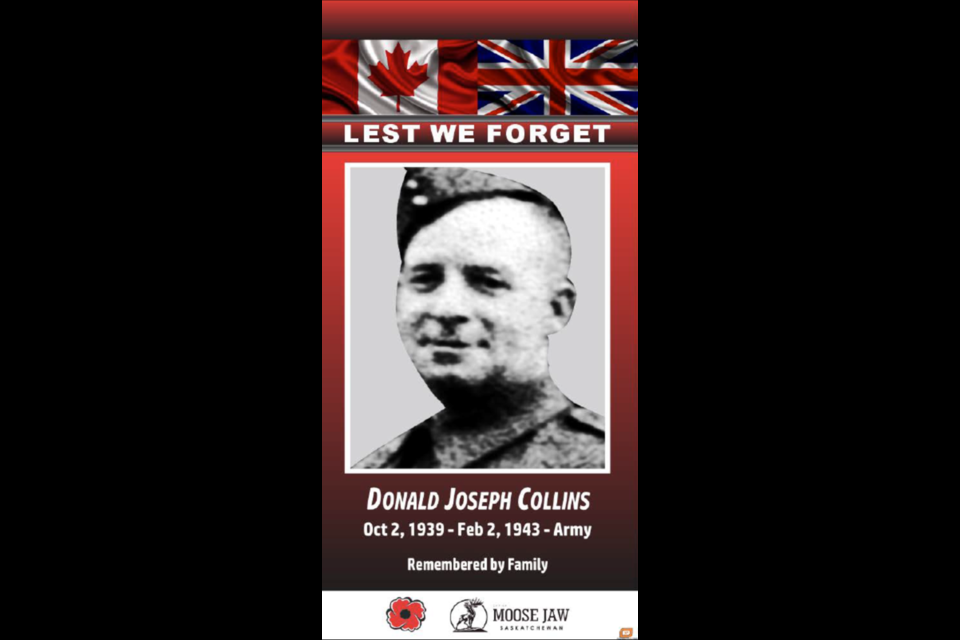Donald Collins and his three brothers, Edward, Emmett and Leo, served their country in wartime and have been honoured with banners on Main Street, along with 23 other men.
This story features the brothers’ biographies, with information taken from the City of Moose Jaw website.
This is part 2 of 7.
Donald Joseph Collins
The youngest of nine children, including eight boys, Don had a lot to live up to. Five of his brothers had enlisted in the First World War, with three returning home. Even though he was old enough to enlist by 1916, his mother refused to send yet another son off to war.
The 1920s were good to Don. He played hockey in California and received his pharmaceutical degree from the University of Saskatchewan. He later married at St Joseph Church in Moose Jaw in 1928 and moved to Mankota to begin his pharmacy career.
The Great Depression, however, was not kind to him or his family. He lost the drugstore and moved his growing family into the home of his brother, Emmett, in Moose Jaw. Eventually, they moved to their own home but moved almost every year, probably due to the inability to pay rent.
Unable to be hired as a pharmacist, he struggled to support his family. Prior to enlisting, Don had served in the militia with the King’s Own Rifles of Canada. Interestingly, the outbreak of the Second World War found the KORC critically short of equipment, to the point where volunteers practised drills and performed sentry duty carrying wooden cutouts in the shape of rifles.
Much as the war was a terrible experience for all, for Don, it provided a much-needed source of steady income to help support his family. Upon his discharge, he did not go back to pharmacy; instead, he became a trainman with the CPR until his retirement in 1963.
Edward James Collins
Edward was the seventh of nine children, born and raised in Broadview. Enlisting on April 12, 1918, in Moose Jaw and formerly employed as an electrical and steam engineer, he served as a sapper with the 2nd Canadian Railway troops. Sappers were adjunct military engineers such as tunnellers, railway troops and foresters.
Collins departed on the SS City of Cairo from the Port of Montreal on Sept. 26, along with 1,075 other young soldiers. Soon, nearly all on board were sick with the Spanish Flu, resulting in 34 deaths while crossing. One of those was Edward, who died on Oct. 8, 1918, and is buried at sea.
As with all who were buried at sea, Edward is memorialized at the Halifax Memorial. His Silver Cross and plaque are now archived at the Saskatchewan Military Museum in Regina.
Emmett Francis Collins
Emmett was the fourth son of Matthew and Margaret Collins of Broadview. A student-at-law, he enlisted in Moose Jaw on July 28, 1915. On Feb 8, 1916, he was promoted to Lance Corporal but soon gave up his stripes to go overseas, becoming a private with Princess Patricia’s Canadian Light Infantry.
On the night of July 16/17, 1916, Emmett suffered a concussion, temporary blindness, and myalgia (severe pain). His diagnosis of “shell shock” resulted in his discharge on April 30, 1917.
Upon discharge, Emmett completed his law degree and was called to the bar both in Manitoba and Saskatchewan, soon practicing in Moose Jaw with “Collins and Church.” Prescribed morphine after his discharge, he soon realized he required more support for his physical pain and emotional flashbacks. Like many veterans at the time, he found himself trying to recover with no social programs or social safety net supporting mental health.
Emmett’s suffering continued for 20 years. Upon the outbreak of the Second World War, he was hired by the federal government of the day and worked in Ottawa until his death in 1945.
Emmett was yet another casualty of war, with an invisible disability. Lest we forget.
Leo Hugh Collins
The eighth of nine children, Leo was born and raised in Broadview and didn’t enlist until May 7, 1918, at age 22. He joined the 260th Battalion of the Canadian Rifles, sailing out of Vancouver to Vladivostok.
The purpose of the Russian front was to provide support to the “White Russians,” those supporting the Tzarist regime. Leo was hospitalized for about a month for a medical condition but soon rejoined his ranks.
Labour unions in Canada’s largest cities were sympathetic to the Bolsheviks, influencing a mutiny by the 259th Battalion in Victoria on the day of boarding. Thirteen soldiers were arrested, the ringleaders court-martialled, and the remaining members of the two Quebec companies were escorted aboard their ship by soldiers with fixed bayonets.
Troops saw little action while in Russia, mainly being responsible for guard duty and administration.
Leo departed for home on May 9, 1919. He also served in the Second World War with the RCAF, supervising air force building construction in Canada, and continued with his law studies.
He articled in Regina, was admitted to the bar in 1949, and was employed by the Saskatchewan provincial government until his retirement in 1963.




